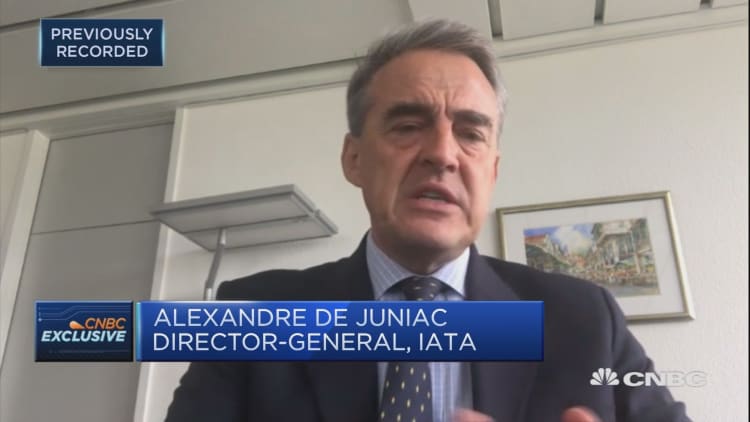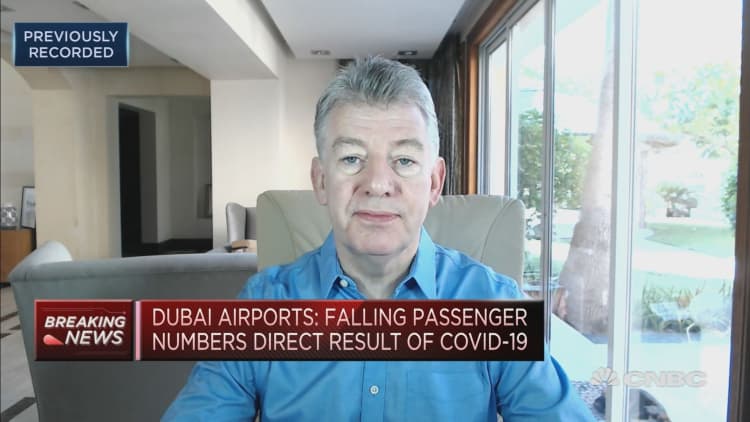
The impact on air travel from the coronavirus will be felt for many years to come, according to the International Air Transport Association, which estimates that passenger traffic won't rebound to pre-crisis levels until at least 2023.
The trade association for the world's airlines said that demand for air travel had dropped more than 90% in Europe and the U.S. since the start of the pandemic, and warned that recovery will be even slower if lockdowns and travel restrictions are extended.
"We are asking governments to have a phased approach to restart the industry and to fly again," Alexandre de Juniac, the IATA's director general and CEO, told CNBC's "Squawk Box Europe" on Thursday. De Juniac is hopeful that some flying will resume by the summer.
"We are aiming at reopening and boosting the domestic market by end of the second quarter, and opening the regional or continental markets — such as Europe, North America or Asia-Pacific — by the third quarter, and intercontinental in the fall," he said.
"So for summer we hope that you will see flights within Europe coming back, with I hope interesting prices and very safe processes of control."
The European Union's external borders remain closed to non-EU nationals until mid-June. The European Commission has recommended a phased approach for its member states to reopen borders that would start with countries with low levels of coronavirus infections.

The comments from the IATA com as travel groups are desperate to bring operations back to life and some are already rolling out plans to do so.
United Airlines has expressed its aims to schedule Europe and China routes in June, Dubai's flagship Emirates Airline will recommence nine outbound routes starting May 21 and European low-cost carrier Ryanair expects to have 40% of its flights running by July 1. Budget carrier Wizz Air will restart routes from London's Luton Airport starting June 16, Lufthansa is planning service expansion in June and IAG will resume some flights in July, among others.
Mandatory quarantine 'useless'
But any hopes for a boost to the industry with some resumed travel will be dashed if governments institute mandatory 14-day quarantine periods for travelers upon arrival, de Juniac warned.
"We are advocating with governments not to implement quarantine measures that will retain people for two weeks that will arrive anywhere," he said.
"We think that it is useless provided we have implemented the health and sanitary controls that we are discussing with governments. It is absolutely key for the tourist industry which is so important for so many countries in Europe."
Scores of countries including Australia, New Zealand, China, Spain and potentially the U.K. are requiring international travelers to quarantine for two weeks upon arrival, with varying degrees of enforcement: in Australia, arrivals are escorted to a hotel where they must remain for 14 days, while in other countries they are expected to "self-quarantine" at home. Hong Kong issued state-monitored tracking bracelets that arrivals must wear to ensure they do not leave their area of quarantine. Such policies will no doubt deter many people from wanting to travel.
De Juniac believes quarantine periods are simply not necessary as long as airlines and airports uphold stringent sanitation and monitoring practices.
"Is it possible to have an aircraft full and without risk of contamination? Our answer is yes," de Juniac said, "provided we implement control and sanitary processes for passengers just before the flight — by asking for temperature control, by the obligation to wear a mask, by cleaning the aircraft properly and disinfecting properly, by limiting the distribution of food to prepackaged food, by limiting cabin luggage to one luggage to avoid disembarking and embarking process to be too overcrowded."
With such a multilayered approach, he argued, "you limit the risk of contamination. ... And then the quarantine is not useful from our point of view in this case."
Looking at the nature of flying — numerous people packed into a tight space, loading and picking up luggage, using the airplane toilets — it's hard to imagine that any sort of virus spread or contamination could be entirely avoided.
But the IATA chief was adamant, citing on-board studies carried out "that demonstrate that the risk of contamination is absolutely minimal even when you don't have special equipment."
He added that air filters in planes ensure safe ventilation, that sitting behind seat backs rather than face to face with other passengers reduces droplet spread and that mandatory masks will further reduce contamination.
"So if you have special equipment, special controls, special cleaning, you reduce the risk to something which will never be zero but will be negligible. That is our strong conviction based on studies, on the equipment we are using — and on something which is even more important, that is safety, which is the key priority of this industry," he said.
De Juniac stressed that passengers' safety came first, and that resumption of activity was ultimately up to government decisions.
"I think the travelers are expecting us to implement a safe process of sanitary and health control for passengers. We are working with governments on that," he added.
"It will be possible to fly safely at least in Europe we hope, and then it depends on government decisions to lift travel restrictions and border closures."


